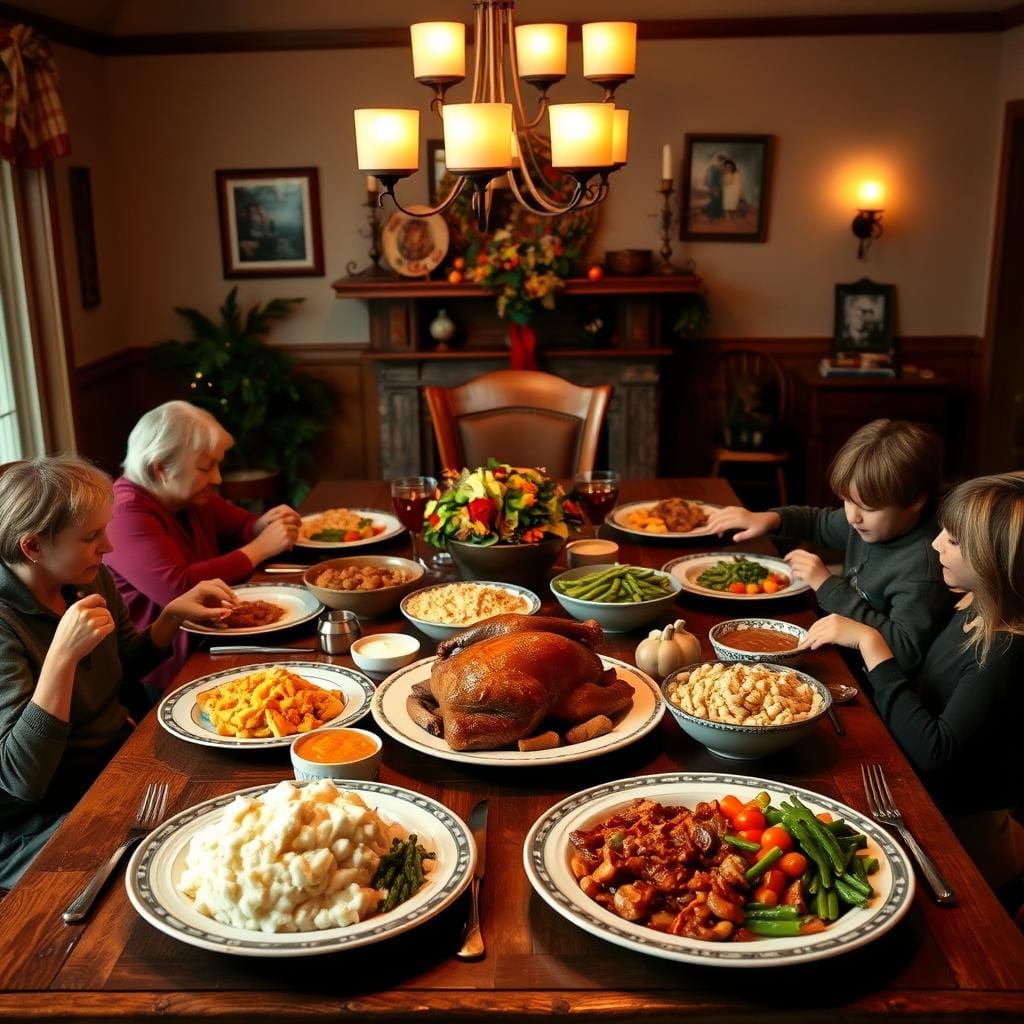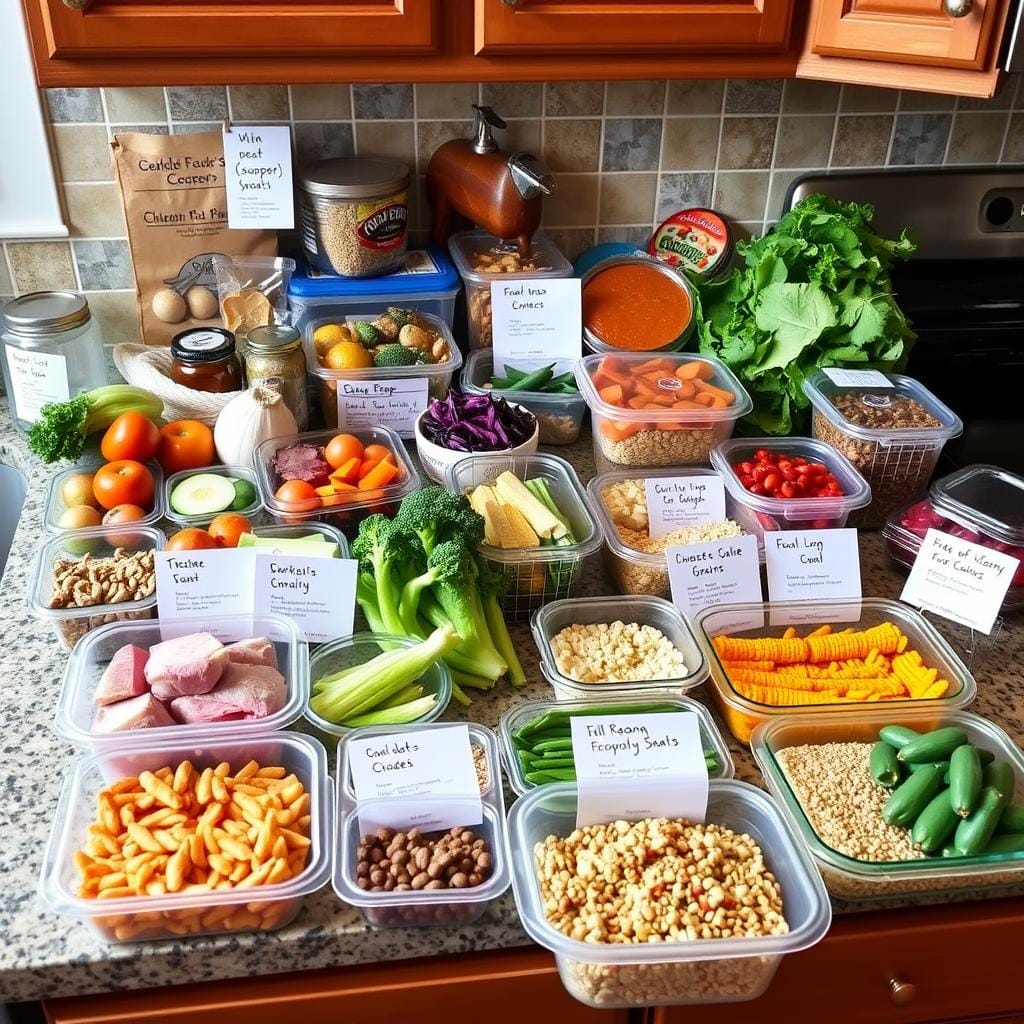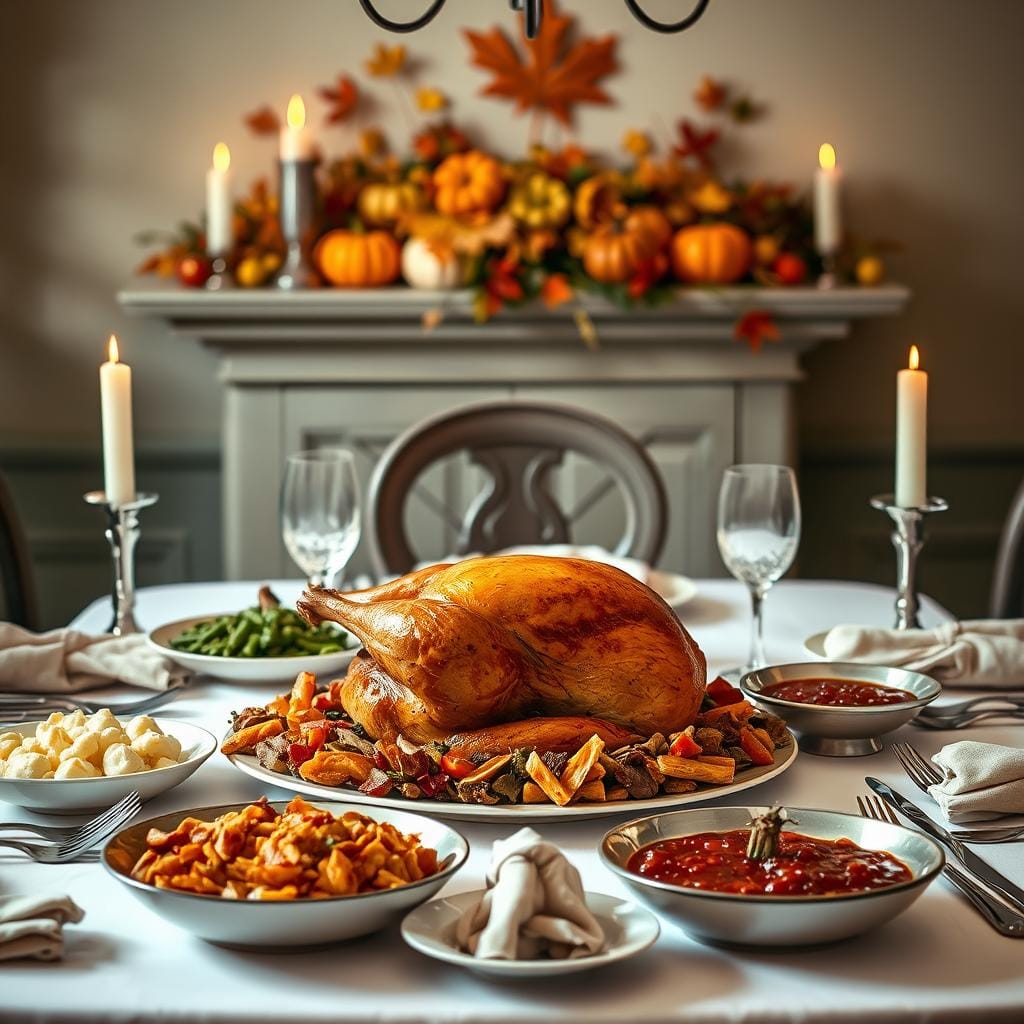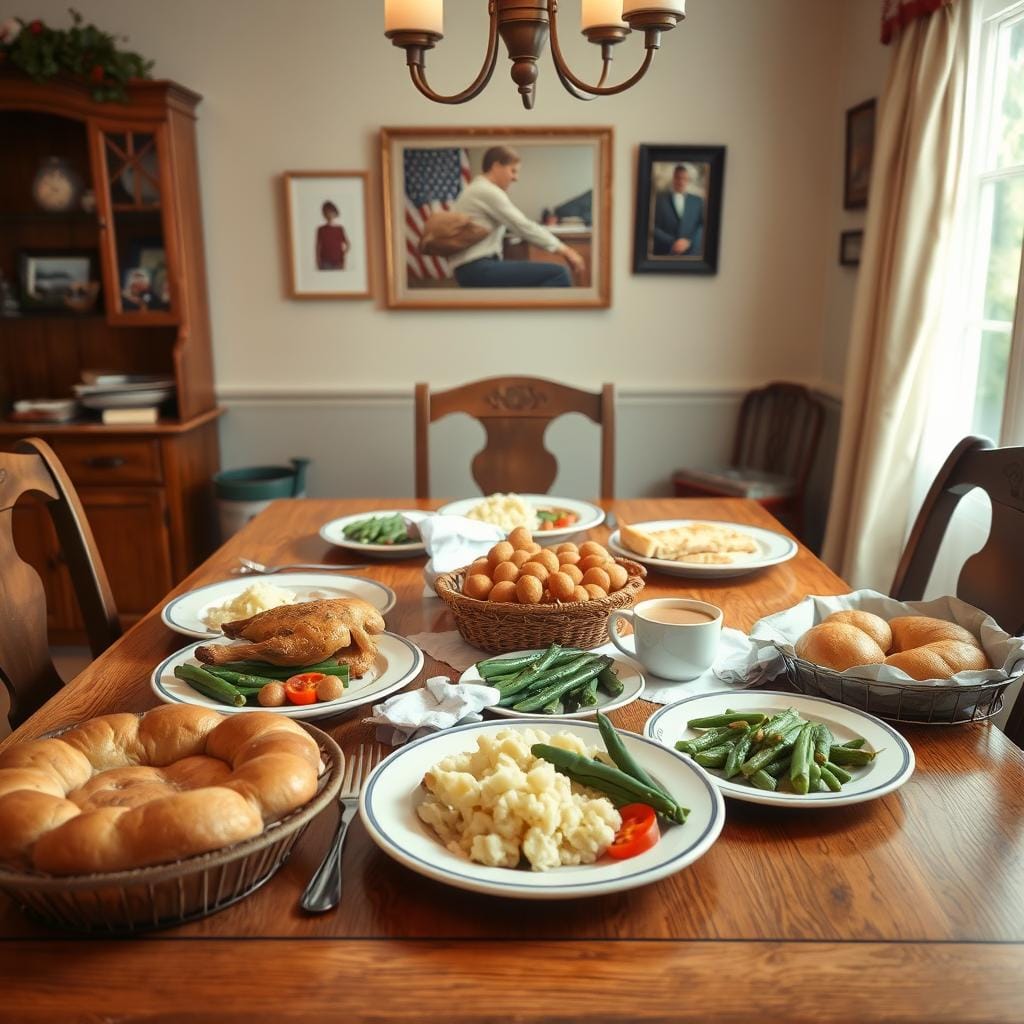Reading time: 10 minutes
Growing up, I remember the magic of family meal traditions. They brought us together around the dinner table. Those moments were about more than just food—they were about connection, sharing stories, and making memories that last forever.
Today, dinner time routines have changed a lot. Busy lives and the need for convenience have altered how American families eat in the evening. Even though technology and work demands keep families apart, the tradition of bonding over food remains important for many. For an inspiring look into iconic meals, explore what Americans eat for dinner.
American family dinners are more than just food—they show the diversity, creativity, and shared experiences of our culture. From quick weeknight meals to big weekend feasts, these dinners highlight the rich culinary heritage of America.
Table of contents
- What is a Typical American Family Dinner?
- Evolution of a Typical American Family Dinner
- Regional Variations in Typical American Family Dinners
- Planning a Week of Typical American Family Dinners
- Classic and Modern American Family Dinner Ideas
- Adding Variety to Your Typical American Family Dinner
- Drinks to Pair with a Typical American Family Dinner
- American Dinner for Special Occasions
- Conclusion
- FAQs
What is a Typical American Family Dinner?
American family dinners are more than just meals. They are a key part of our culture that brings families together. These moments turn simple food into a way to feel connected and understood.

Food has always been at the heart of American culture. Dinner tables are where memories are made, stories are told, and traditions are kept alive.
Cultural Significance of Family Meals
Mealtime is not just about eating. It’s a chance for families to connect and share their stories. Studies show that eating together:
- Improves communication
- Strengthens emotional bonds
- Helps understand family history
- Increases cultural knowledge
“The family table is where culture, love, and nourishment intersect.” – Unknown
American food is a mix of many cultures. From European dishes like pot roasts to Native American cornbread, each meal has its own story. These stories are about migration, adaptation, and new ideas in cooking. For a deeper dive into regional food traditions, learn more about Southern family dinner recipes.
| Cultural Influence | Notable Dishes |
|---|---|
| European | Apple Pie, Shepherd’s Pie |
| Native American | Cornbread, Frybread |
| African American | Soul Food, Gumbo |
Today, American family dinners are changing. They mix old recipes with new tastes. But the main goal remains the same: to bring families closer together.
Evolution of a Typical American Family Dinner
Over the years, American family dinners have changed a lot. Today’s dinners are far from the traditional meals of the past. Now, we see everything from homemade feasts to quick, easy meals.
The history of American family dinners shows interesting cultural changes. In the early 1900s, dinners were big, homemade affairs. Families would spend hours making and eating meals together.
Changing Dinner Landscapes
Regional tastes have shaped American family dinners. Each area has its own special dishes:
- Northeast: Pizza and seafood are favorites
- Midwest: Meat dishes and casseroles are common
- Southwest: Tacos and spicy foods are popular
- Southern states: Fried chicken and comfort foods are loved
Popular Ingredients in Modern Family Dinners
Today’s dinners are all about convenience and variety. New tools like instant pots and air fryers make cooking easier. They help us make complex dishes quickly.
| Decade | Typical Dinner Ingredients |
|---|---|
| 1950s | Meatloaf, potatoes, canned vegetables |
| 1980s | Frozen meals, microwave dishes |
| 2020s | Meal kits, plant-based proteins, global cuisines |
“Family dinners are less about the food and more about the connection,” says nutrition expert Dr. Emily Rodriguez.
While we have more convenient options, we also care more about what we eat. Families now aim for balanced meals with lots of veggies and different proteins. The changes keep coming, showing how society and cooking are evolving.
Regional Variations in Typical American Family Dinners
Exploring American family dinners shows a rich mix of culinary traditions. Each region has its own southern family dinner recipes and specialties. These dishes tell stories of local culture and heritage.
America’s vast geography leads to a culinary map of distinct flavors and cooking styles. From coastal seafood to heartland comfort foods, family dinners across the country are incredibly diverse.
Southern Family Dinner Traditions
Southern cuisine is known for its unique flavors and hearty dishes. Classic southern family dinner recipes include:
- Biscuits and gravy
- Fried green tomatoes
- Pimento cheese spreads
- Grillades from Louisiana
Regional Specialties Across the United States
Each region adds its own twist to family dinners:
| Region | Signature Dish |
|---|---|
| New England | American Chop Suey |
| Southwest | Cowboy Beans |
| Midwest | Hotdish Casserole |
| Hawaii | Loco Moco |
| Appalachia | Pepperoni Rolls |
These regional specialties reflect local ingredients, cultural influences, and generations of culinary tradition.
“Food is our common ground, a universal experience.” – James Beard
Understanding regional differences in American family dinners shows the incredible culinary diversity. This makes American cuisine unique and exciting.
Planning a Week of Typical American Family Dinners
Creating a balanced weekly dinner menu can change your family’s eating habits. It saves time and money too. Planning meals for a week needs careful prep and choosing the right ingredients.

Good meal planning starts with knowing your family’s needs and your schedule. A smart plan can lead to tasty, affordable meals that everyone likes. For tips on planning wholesome meals, check out balanced American dinner ideas.
Meal Prep Strategies for Family Dinners
Effective meal prep for family dinners includes several key steps:
- Batch cook proteins like chicken and ground beef
- Pre-chop vegetables for quick assembly
- Use slow cookers for convenient meal preparation
- Create versatile base ingredients that can be used in multiple dishes
Creating a Balanced Weekly Dinner Menu
Plan a dinner menu that offers variety and nutrition. Here’s a sample weekly plan:
| Day | Main Dish | Protein | Calories |
|---|---|---|---|
| Monday | Chicken Artichoke Skillet | Chicken | 225 |
| Tuesday | Hamburger Stir-Fry | Beef | 399 |
| Wednesday | Salmon Tacos | Fish | 335 |
| Thursday | BBQ Chicken Sliders | Chicken | 424 |
| Friday | Enchilada Casser-Ole! | Mixed | 357 |
| Saturday | Baked Spaghetti | Ground Beef | 526 |
| Sunday | Black Bean Chicken with Rice | Chicken | 400 |
“Meal planning isn’t about perfection, it’s about progress and making home-cooked meals more accessible.” – Meal Prep Expert
By using these strategies, you’ll make meal prep easier, reduce stress, and ensure your family eats healthy, tasty meals every night.
Classic and Modern American Family Dinner Ideas
Family dinners are more than just food. They’re a special time to come together. Whether you love meat dishes or prefer vegetarian options, there’s something for everyone.
Today’s families are mixing old favorites with new twists. They’re using fresh recipes that keep traditional tastes but add a modern touch.
Traditional Hearty Meat Dishes for Family Dinners
Meat dishes are a big part of American family meals. Here are some favorites:
- Texas-style barbecue chicken (370 calories per serving)
- Classic pot roast with root vegetables
- Mini meatloaf with quick cooking times
Classic Recipes with a Modern Twist
Making old recipes new again keeps dinner exciting. Try these modern takes:
- Swap heavy cream for Greek yogurt in casseroles
- Try cauliflower rice instead of regular grains
- Play with different seasoning blends from around the world
Incorporating Vegetarian Options
Vegetarian meals are becoming more popular. Here are some tasty plant-based options:
| Dish | Calories | Preparation Time |
|---|---|---|
| Quinoa Vegetable Bowl | 250 | 30 minutes |
| Bean-based Casserole | 320 | 45 minutes |
| Teriyaki Tofu Stir-Fry | 280 | 25 minutes |
“Food is our common ground, a universal experience.” – James Beard
By mixing old and new, you can make family dinners unforgettable. They celebrate the rich flavors of American food.
Adding Variety to Your Typical American Family Dinner
Spicing up your family dinner can turn ordinary meals into exciting experiences. When planning an authentic American dinner party, think about adding diverse recipes. These can spark conversations and delight everyone’s taste buds.
To add variety to family meals, you need creativity and planning. Here are some ways to make your dinner gatherings unforgettable:
Themed Dinner Nights
- Taco Tuesday with build-your-own stations
- Italian Friday featuring homemade pasta
- International cuisine exploration nights
Interactive Dinner Party Strategies
Engagement is key when hosting a family dinner. Encourage everyone to help with meal prep and planning. Some fun ways to do this include:
- Rotating chef responsibilities
- Collaborative recipe selection
- Dietary preference accommodations
“A great dinner party isn’t about perfection, but about creating memories around the table.”
Recipe Diversity Tips
Try new cooking techniques and ingredients to keep dinners exciting. Consider these recipes:
- Garlic-butter shrimp with orzo
- Spatchcocked chicken with roasted vegetables
- Tex-Mex cast-iron skillet pasta
By using these strategies, you’ll turn routine dinners into special family moments. Everyone will look forward to these extraordinary experiences.
Drinks to Pair with a Typical American Family Dinner
Choosing the right drinks can make a meal special. When picking drinks for a typical American family dinner, look for options that match your meal and everyone’s taste.
Drinks are more than just something to drink. They can make flavors pop, refresh your taste, and create lasting memories.
Beverages That Complement a Typical American Family Dinner
Different meals need different drinks. Here are some classic picks:
- Water: Always the healthiest and most versatile option
- Iced Tea: A Southern classic that pairs with most meals
- Lemonade: Perfect for children and warm evenings
- Soft Drinks: Occasional treats for younger family members
Serving Tips for a Typical American Family Dinner
Knowing how to serve drinks can make your meal better. Here are some tips:
- Choose the right glass for each drink
- Serve drinks at the best temperature
- Offer both non-alcoholic and alcoholic drinks
- Think about what each person likes
| Meal Type | Recommended Beverages | Serving Suggestions |
|---|---|---|
| Grilled Meats | Red Wine, Craft Beer | Serve at room temperature |
| Seafood | White Wine, Sparkling Water | Chill glasses beforehand |
| Vegetarian Dishes | Herbal Iced Tea, Lemonade | Garnish with fresh herbs |
“The right drink can turn a good meal into an unforgettable dining experience.” – Culinary Expert
Understanding your family’s tastes and trying new drinks is key. Enjoy finding the perfect drinks to make your American family dinner special!
American Dinner for Special Occasions
Special occasions bring people together, making meals unforgettable. Whether it’s holiday dinners or personal milestones, American cuisine has it all. It offers a wide range of festive meals that celebrate the joy of being together.

Holiday Dinners: A Typical American Celebration
Holiday dinners are at the heart of American traditions. From Thanksgiving turkey to Christmas ham, these meals connect us to our culture. Some must-try dishes include:
- Key Lime pie for summer gatherings
- Roasted rack of lamb for elegant celebrations
- Coq au vin as a sophisticated dinner option
Festive Meals for Birthdays and Anniversaries
Personal celebrations need menus that reflect individual tastes. Chefs suggest dishes like:
- Pan-seared duck breast for romantic anniversaries
- Miso-marinated salmon for health-conscious birthdays
- Whipped ricotta appetizers for intimate gatherings
American BBQ Traditions for Outdoor Gatherings
Summer brings American BBQ traditions to life. Grilling becomes an art, with many techniques and flavors:
- Grilled Maine lobster with summer corn
- Plant-based backyard vegetable paella
- Chilaquiles for a multicultural BBQ experience
Creating Memorable Menus for Special Events
Making the perfect special occasion menu takes creativity and detail. Think about unique ingredients, cooking methods, and personal touches. These elements can make your meal unforgettable.
“A great meal is about more than food—it’s about memories shared around the table.”
From small family dinners to big celebrations, American cuisine has endless options. It helps create unforgettable moments at the table.
Conclusion
Understanding what a typical American family dinner is shows more than just a meal. It’s a cultural touchstone that connects generations. Research shows that family meal traditions are key in child development and family bonding.
Your home-cooked meals are powerful for creating lasting memories. The Family Matters study found that family dinners improve children’s emotional well-being and diet. They also help with social interactions. By making family dinners a priority, you’re not just feeding your family. You’re also nurturing their health.
Modern family dinners have changed, but they keep the core of connection. Whether you’re making a traditional dish or trying new cuisines, the goal is to create a space for meaningful talks. This helps in building stronger family bonds.
In the end, the typical American family dinner is a tradition that evolves but keeps its core values. Your dedication to these moments creates a rich tapestry of family memories. These memories last through generations.
FAQs
American families often eat meals like roast chicken, pasta, burgers, pizza, or hearty dishes like meatloaf and mashed potatoes, depending on preferences and regions.
Southern dinners feature BBQ and fried chicken, Midwest meals focus on casseroles and hearty stews, while coastal regions enjoy seafood-based dishes.
Combine a protein (e.g., chicken or beef), a starch (e.g., potatoes or rice), vegetables, and a light dessert for a well-rounded meal.
Focus on classic dishes like roast turkey or BBQ ribs, add sides like coleslaw or cornbread, and create a warm ambiance with themed decor and drinks.

